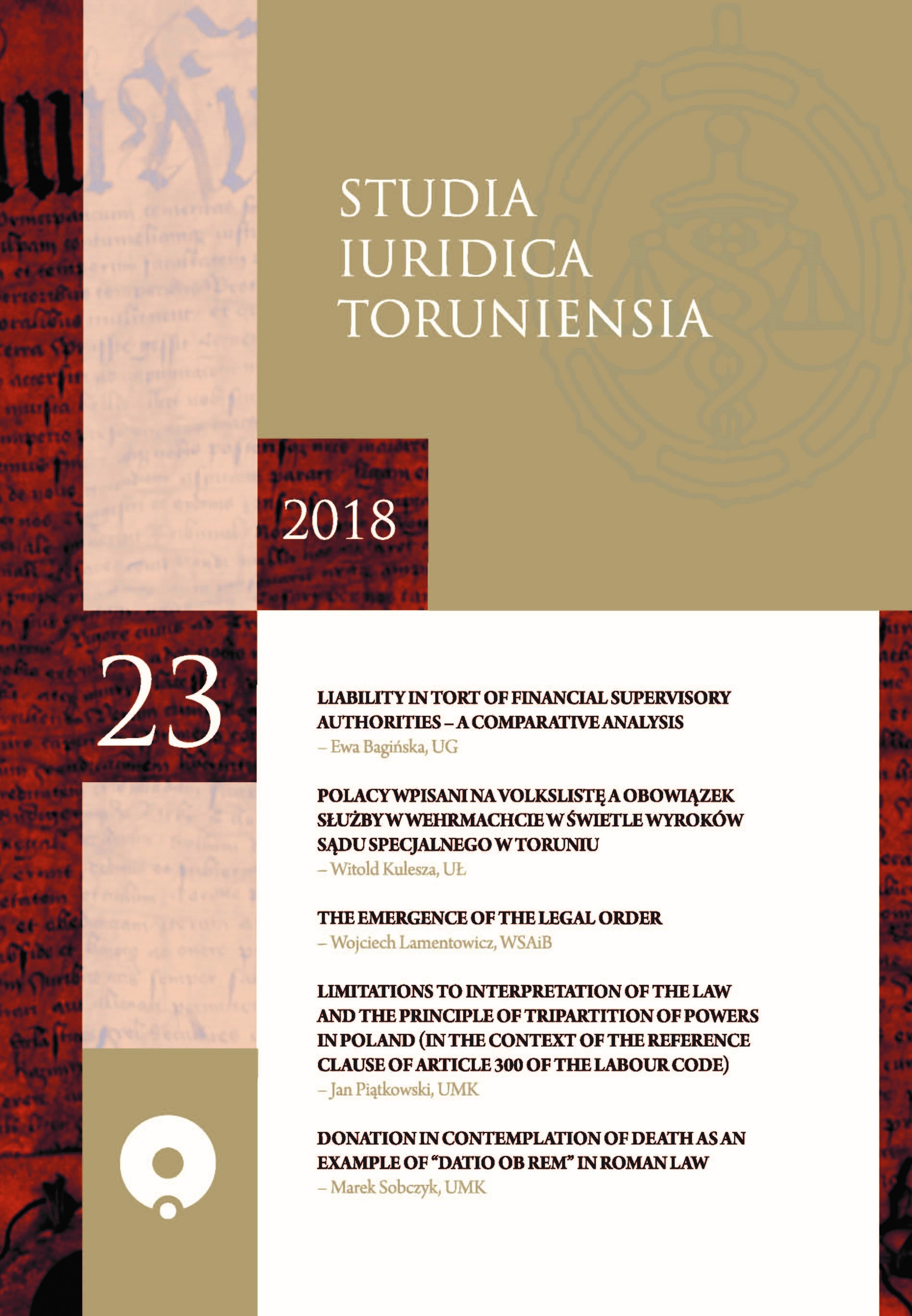Poles inscribed on the Volkslist and duty to serve in the Wehrmacht in the light of the verdicts of the Special Court in Toruń
DOI:
https://doi.org/10.12775/SIT.2018.031Keywords
Toruń during World War II, Poles in the Wehrmacht, German national list, Volksdeutsch, German Special Court in ToruńAbstract
Poles who lived in the northern part of Poland defeated in September 1939, were forcibly subjected to germanization by the German authorities enrolling them onto a list of German nationals (Volksliste) and incorporating into the German army against their will. Any attempts to avoid the appointment to the Wehrmacht, also by those who did not have the citizenship of the Third Reich, were punished as attempts to commit the crime of weakening the defense power of the German state. The cruel punishment of resistant Poles was performed by a German Special Court in Toruń, which sentenced, among others, to a death penalty a Pole who was called to military service, but while not wanting to leave his German wife, he cut off his fingers to avoid the enrollment. The Supreme Court of the Reich established the principle that Poles who receive a military appointment, even if they did not have German citizenship, are to be punished. The Poles called to serve in the Wehrmacht found themselves in an impossible situation. They could have died at the front or in a German prison or a concentration camp. Therefore, those who were forcibly incorporated into the Wehrmacht often deserted, for which they were also threatened with the death penalty.
References
Bauer F., Die Humanität der Rechtsordnung. Ausgewählte Schriften, Frankfurt/ Main 1998.
Borodziej W., Lemberg H. (red.), Niemcy w Polsce 1945–1950. Wybór dokumentów, T. I, Warszawa 2000.
Cyprian T., Sawicki J., Siedem wyroków Najwyższego Trybunału Narodowego, Poznań 1962.
Dalcke A., Strafrecht und Strafverfahren, Berlin–München 1940.
Dunin-Wąsowicz K., Obóz koncentracyjny Stutthof, Gdańsk 1970.
Epstein C., Wzorcowy nazista. Arthur Greiser i okupacja Kraju Warty, przeł. J. Włodarczyk, Wrocław 2010.
Gilbert G.M., Dziennik norymberski, przeł. T. Łuczak, Warszawa 2012.
Kochanowski J., Losy Niemców w Polsce Centralnej w latach 1945–1950, w: Niemcy w Polsce 1945–950. Wybór dokumentów, red. W. Borodziej, H. Lemberg, T. II, Warszawa 2000.
Kopka B., Niemcy i Polacy w obozach pracy administrowanych przez resort bezpieczeństwa publicznego w Polsce 1945–1954: terror i praca, w: Władze komunistyczne wobec ludności niemieckiej w Polsce w latach 1945–1989, red. A. Dziurok, P. Malajczyk, S. Rosenbaum, Warszawa 2016.
Kulesza W., Crimen laesae iustitiae. Odpowiedzialność karna sędziów i prokuratorów za zbrodnie sądowe według prawa norymberskiego, niemieckiego, austriackiego i polskiego, Łódź 2013.
Kulesza W., Polska godność narodowa w świetle prawa karnego, „Czasopismo Prawno-Historyczne” 2018, t. LXX, z. 1.
Kulesza W., Przedmowa do polskiego wydania, w: H. Langbein, Auschwitz przed sądem. Proces we Frankfurcie nad Menem 1963–1965. Dokumentacja,
Wrocław–Warszawa–Oświęcim 2011.
Kulesza W., Sąd Specjalny (Sondergericht) w Łodzi, w: Gmach i jego tajemnice. Sąd Okręgowy w Łodzi 1917–2017, Łódź 2017.
Kulesza W., Völkermord vor Gericht in Polen. NS-Verbrechen im Reichsgau Danzig-Westpreußen im Lichte des Strafprozesses gegen Richard Hildebrandt,
w: Kriegsverbrechen, NS-Gewaltverbrechen und die europäische Strafjustiz von Nürnberg bis Den Haag, Hrsg. H. Halbrainer, C. Kuretsidis-Haider, Graz 2007.
Kulesza W., Wysiedlenia z Kraju Warty (Warthegau) w świetle procesu Gauleitera Artura Greisera, w: Ludność cywilna w Łódzkich obozach przesiedleńczych, red. J. Żelazko, Łódź 2010.
Podgóreczny M., Albert Forster. Gauleiter i oskarżony, Gdańsk 1977.
Proces Artura Greisera przed Najwyższym Trybunałem Narodowym, Główna Komisja Badania Zbrodni Niemieckich w Polsce, Warszawa 1946.
Przybyszewski K., Z działalności hitlerowskiego Sądu Specjalnego (Sondergericht) w Toruniu 1942–1943, „Rocznik Toruński”, T. 2, Toruń 1967.
Ritter E., Justiz und innere Verwaltung, w: Enzyklopädie des Nationalsozialismus, München 1998.
Sagenschneider M., 50 Klassiker Prozesse, Hildesheim 2005.
Schenk D., Albert Forster gdański namiestnik Hitlera, przeł. W. Tycner, J. Tycner, Gdańsk 2002.
Schlüter H., „…für die Menschlichkeit im Strafmaß bekannt…”. Das Sondergericht Litzmannstadt und sein Vorsitzender Richter, „Juristische Zeitgeschichte NRW“, Band 14, Recklinghausen 2007.
Wardzyńska M., Wysiedlenia z okupowanych ziem polskich włączonych do III Rzeszy w latach 1939–1945, Warszawa 2017.
Waszczyński J., Z działalności hitlerowskiego Sądu Specjalnego w Łodzi w Łodzi (1939–1945), „Biuletyn Głównej Komisji Badania Zbrodni Hitlerowskich w Polsce” 1972, t. XXIV.
Downloads
Published
How to Cite
Issue
Section
Stats
Number of views and downloads: 2607
Number of citations: 0



